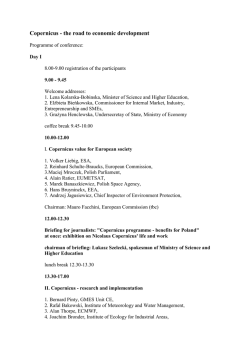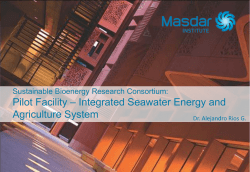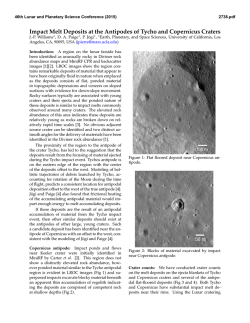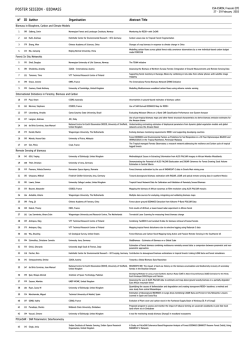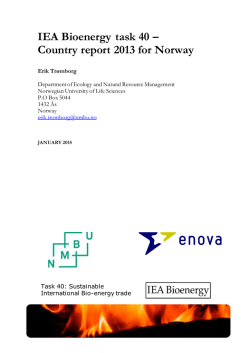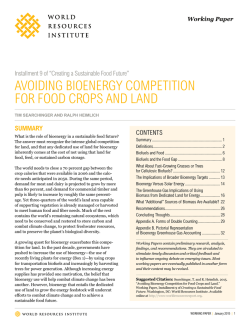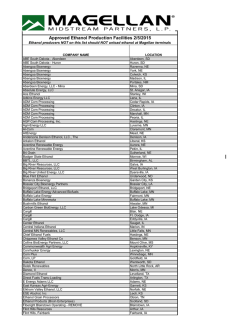
bioenergy in context by dr Martin Junginger (pdf)
Copernicus Institute of Sustainable Development Energy & Resources Realizing the Bio-Based Economy: Bioenergy in context Dr. Martin Junginger E&R Seminar series 29 January 2015 Copernicus Institute of Sustainable Development The E&R Bioenergy cluster Cluster leader: Dr. Martin Junginger Senior scientists: Dr. Birka Wicke, Dr. Floor van der Hilst and Dr. Ric Hoefnagels 15 PhD students and junior researchers: Chun Sheng Goh, Gert-Jan Jonker, Judith Verstegen, Sarah Gerssen-Gondelach, Vassilis Daioglou, Marnix Brinkman, Anna Duden, Sierk de Jong, Ingeborg Kluts, Thuy Mai-Moulin, Jorge Moncada, Yudistira Wachyar, Yannis Tsiropoulos, Giannis Dafnomillis, Kostis Tzanetis ..and strong links to clusters of Dr. Andrea Ramirez (Biobased Materials) and Dr. Pita Verweij (Land Use and Biodiversity) Copernicus Institute of Sustainable Development Our research areas: Feedstock supply: a broad set of issues surrounding biomass production (both residues and dedicated crops) requires increasing attention, including land-use, biodiversity, water, soil, carbon stocks, and various socio-economic factors. Copernicus Institute of Sustainable Development Our research areas: Logistics: To secure significant volumes of biomass, scalingup and design of (international) supply chains provide new challenges, including optimization of harvest, pre-treatment, transport, storage, etc. [Source: John Swaan / WPAC ] Copernicus Institute of Sustainable Development Our research areas: Conversion side: we model conversion processes and understanding the impacts of novel technologies and opportunities to sustainably (co-) produce of value-added products and energy. [Source: DSM Poet ] Copernicus Institute of Sustainable Development Our approach: • • • 6 Need for integrated, holistic and multidisciplinary assessments, including interlinkages with other fields Large variety of methods and tools used, e.g. geographically explicit land-use change modelling, techno-economic technology assessment, Life-Cycle Assessment, optimisation of logistic chains etc. Strong collaboration with partners in the department, the GeoScience faculty, the Netherlands, EU and top research institutes world-wide (especially Brazil, USA, but also many others) Copernicus Institute of Sustainable Development What is the Biobased economy? • encompasses all activities related to biomass production and subsequent conversion to energy and materials. • aims at reducing the carbon footprint of energy and material supply, and the dependence on finite and increasingly costly fossil fuels Copernicus Institute of Sustainable Development The Dutch bio(based) economy [Goh and Junginger, 2015 ] Copernicus Institute of Sustainable Development The Dutch biobased economy Wood pellets Wood Paper and Cardboard [Goh and Junginger, 2015 ] Copernicus Institute of Sustainable Development [IPCC –SRRES & Dornburg et al., Energy & Environmental Science, 2010] Understanding biomass resource potentials requires integration of many science arena’s Copernicus Institute of Sustainable Development Current global bioenergy feedstock use [IPCC-SRREN, 2011] Copernicus Institute of Sustainable Development 2050 Bioenergy Potentials & Deployment Levels [IPCC-SRREN, 2011] Copernicus Institute of Sustainable Development Global solid trade by 2030/2050? (Kranzl et al., Chp 8 In Junginger et al. Int. Bioenergy Trade, Springer 2013) Copernicus Institute of Sustainable Development Key uncertainties biomass potentials Issue/effect Supply potential of biomass Improvement agricultural management Choice of crops Food demands and human diet Use of degraded land Competition for water Importance *** *** *** *** *** Impact on poten supply as e recent s ** ** ** ** ** Demand for biomaterials * GHG balances of biomass supply chains * Use of agricultural/forestry by-products Protected area expansion Water use efficiency Climate change Alternative protein chains Demand potential of biomass Bio-energy demand versus supply Cost of biomass supply Learning in energy conversion Market mechanism food-feed-fuel ** ** ** ** demand as e recent s Dornburg et al., 2010: Joint paper by UU (lead), WUR/LEI, PBL, ECN, IVM/VU Amsterdam Copernicus Institute of Sustainable Development What are (some of) the main issues for bioenergy and the biobased economy at large • Direct environmental impacts of dedicated (energy) crops and using biomass residues • Indirect effects – food security and indirect landuse change • Efficient logistics: need for pretreatment technologies and optimized logistic chains to minimize cost and GHG emissions Copernicus Institute of Sustainable Development Thank you for your attention! Dr. Martin Junginger [email protected] http://www.uu.nl/staff/hmjunginger/ References • Dornburg, V., Van Vuuren, D., et al. Bioenergy revisited: Key factors in global potentials of bioenergy. Energy and Environmental Science 3 (3), pp. 258-267 • Faaij, A., Moreira, J.R., Chum, H., (Convening Lead Authors), Junginger, M. (Contributing Author) et al. (2011), Chapter 2: Bioenergy. In: IPCC Special Report on Renewable Energy Sources (SRRES). • Goh, CS, Junginger, H.M. Sustainable biomass and bioenergy in the Netherlands: Report 2014. Commissioned by RVO. Forthcoming, February 2015. • Junginger, M., Goh, C. S., & Faaij, A. (Eds.). (2014). International Bioenergy Trade: History, status & outlook on securing sustainable bioenergy supply, demand and markets. Springer. Copernicus Institute of Sustainable Development Copernicus Institute of Sustainable Development 1) Questions and comments on the presentations? 2) Invitation for further cooperation: what are new & further possibilities to work together in the department of IMEW and GeoScience faculty at large? Copernicus Institute of Sustainable Development Statements for discussion • Can use of wood pellets for electricity production help to mobilize sustainable forestry resources and achieve short-term GHG emission reductions? • Should biomass feedstock production for the biobased economy be maximized in the EU before relying on imports? • Is it wishful thinking that indirect effects of feedstock production can be avoided or mitigated? Copernicus Institute of Sustainable Development Statements KNAW for discussion • • Meestook van hout leidt niet tot innovatie en de bijdrage aan de vermindering van CO2-uitstoot is onzeker. Het is geen effectieve manier om de uitstoot van broeikasgas te verlagen. Biobrandstof concurreert met voedsel. Vanwege gebrek aan grond wordt ongerepte grond ontgonnen zodat daar het voedsel kan worden geteeld dat door biobrandstof is verdrongen (‘Indirect Land Use Change’ ofwel ILUC). Copernicus Institute of Sustainable Development Energy & Resources Copernicus Institute of Sustainable Development Bioenergy: Driving forces, dimensions, scales… [IPCC-SRREN, 2011] Copernicus Institute of Sustainable Development
© Copyright 2026
